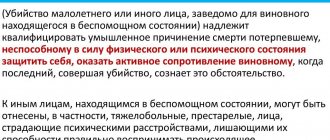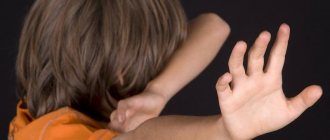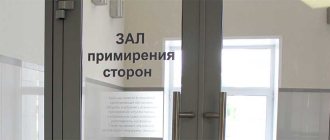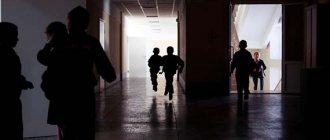For criminal acts against minors, Russian criminal legislation provides for rather severe penalties. And this is quite logical, because... Children belong to the most vulnerable category of the population, therefore, respecting their rights and ensuring their safety stands apart in every civilized country in the world.
Quite often, minors find themselves victims of criminal schemes (theft, begging, prostitution, etc.) in which adults involve them, and less often children suffer from abuse by their parents. In all cases, the criminal law is equally harsh towards those who infringe on the rights and freedoms of a child. Today the punishment is quite long terms of imprisonment.
But cases are no less common when the subject of a crime (criminal) turns out to be the same minor as the victim of criminal acts. What does criminal law say about this? In our article we will tell you what parents should do if their child was beaten at school.
Criminal liability of minors
Important! Please keep in mind that:
- Each case is unique and individual.
- A thorough study of the issue does not always guarantee a positive outcome. It depends on many factors.
To get the most detailed advice on your issue, you just need to choose any of the options offered:
- Use the online chat in the lower corner of the screen.
- Call: Federal number: +7 (800) 511-86-74
To begin with, it should be noted that beating a child at school, in all possible forms, constitutes a criminal offense. It turns out that any physical impact on a child can be adjusted to one or another article of the criminal code. But when it comes to a minor attacker(s), everything is much more complicated.
It is known that criminal punishment in any of its manifestations cannot be applied to persons under 14 years of age at the time of the commission of the act. It is generally accepted that a child at this age is not yet fully aware of what he is doing. Naturally, the kid imagines the possible consequences of the act extremely vaguely.
Criminal legislation allows the application of certain types of punishment in relation to persons whose age is 14-16 years (at this age the vast majority of the acts to which our article is devoted are committed). But it is precisely this age segment that is the most difficult in terms of assigning punishment.
For example, criminal liability in the form of imprisonment can be imposed on persons aged 14 to 16 years only for committing serious or especially serious crimes. Plus, a fourteen-year-old teenager cannot be held criminally liable in the form of imprisonment if he has committed a crime of minor or moderate gravity for the first time. This is a key point, because... Schoolchildren beating their peers is rarely a one-time occurrence.
What can the school administration do with a bully student?
According to lawyers, the school administration today does not have many opportunities to influence the situation. The management of an educational institution does not have the right to take any actions that limit a student’s right to receive an education. According to the Law “On Education in the Russian Federation”, it is impossible to expel a student from school before he reaches the age of 15. According to the law, such a student cannot be retained for the second year, since bad behavior is not a reason for this. Such schoolchildren cannot be brought to administrative responsibility. Apply Part 1 of Art. 2.3 of the Code of Administrative Offenses of the Russian Federation in relation to a student is only possible from the age of 16.
“From a legal point of view, for example, within the framework of administrative offenses, hooliganism (minor) is considered a violation of public order, expressing clear disrespect for society, accompanied by obscene language in public places, offensive harassment of citizens, as well as destruction or damage to other people’s property. An administrative fine is provided for such an offense. In this case, a person who has reached the age of 16 at the time of committing an administrative offense is subject to administrative liability,” says lawyer Nathan Budovnits .
Article on the topic
My child is a fighter! What is the cause of childhood aggression?
However, to ensure that such impunity does not get away with and that other children do not copy the bad example, the school administration needs to solve the problem in a timely manner and take the necessary measures.
“It should be noted that this institution bears responsibility for harm caused to children while in an educational institution. Therefore, measures of influence on a bully must first of all be developed and applied by the administration of the educational institution together with the teaching staff (where a teacher, by definition, is a person who carries out not only teaching activities, but also educational work),” says Budovnits.
The school should influence problem students through dialogue and joint decision-making with parents. The class teacher, in addition to an educational conversation with the student, can invite his parents to school and have a conversation with them.
“That is, parents of affected children first of all need to contact the management of the educational institution, which is obliged to take measures to resolve the problematic situation. If an educational institution does not fulfill its duties, then it is necessary to complain to a higher authority: the Department of Education,” says Budovnits.
Traumatic brain injury in the classroom. In the Samara region, a student hit a teacher More details
A child was beaten at school: what to do?
Of course, every normal parent, faced with a situation where a son or daughter was beaten at school, will want to immediately look into this in order to prevent this from happening in the future. Next, we will talk about what actions and in what order a parent should take in such cases.
Step 1. Visit school
It is logical that it is initially necessary to visit the school and try to find out the identity of the offender (usually this is not difficult) and find out the reasons and circumstances of the beating of the child. Because We said that criminal penalties are not applied to those under 14 years of age; we will consider the situation when the age of the offenders has already crossed this threshold.
The fact is that each school has a juvenile affairs inspector assigned to it, who must be immediately informed of everything that happened.
Step 2. Recording the beatings
In this case, everything depends on “motivation”, because Quite often, after a parent has visited the school, the parents of the offenders are also called, who will certainly try to put the brakes on the matter and solve the problem verbally, assuring that this will not happen again.
Considering that in 8 out of 10 cases, the beating of a child is repeated, the removal of beatings is an important and almost mandatory procedure. There are two options here: either you remove the beating from the child and give this certificate a go, or after the examination, put the received certificate in a drawer, because it will most likely come in handy in the future.
Step 3. Contacting law enforcement agencies
This step is optional, and again depends on the motivation of the parent. Usually, the PDN inspector directly mentioned by us, who, among other things, often also performs the functions of a psychologist, dissuades from such treatment. Of course, regardless of your desire, the offender will be registered in the so-called children's room (previously they were called police children's rooms). This registration is completed by a PDN inspector, and this does not require a court decision or sanctions from any officials.
According to statistics, parents whose boy or girl was beaten at school for the first time rarely contact law enforcement agencies. Usually the case is closed by registration in the children's room, or with the registration of a traffic police inspector. Next, we will tell you what parents should do if the beating of their child is systematic.
School fights - responsibility for schoolchildren's fights
Very often children fight. And, sad as it is, school fights end in injuries, damage to the health and psyche of children.
How to deal with fights at school? How can parents influence the situation? Preventing child cruelty and, accordingly, schoolchildren’s fights can only be done by appropriately raising a child from birth, by limiting the viewing of murders, fights and violence on TV and the Internet. Unfortunately, in our society, not every person can raise a child with dignity. And you can’t protect a child from meeting a bully at school. However, you can influence how bullies treat your child. After all, weak children are most often chosen for beatings. Therefore, it would be a good idea to engage in physical training for the child. If not boxing, then at least running.
Where should parents go if their child was beaten at school for the second time?
Unfortunately, young offenders are rarely stopped by the fact that, while still children, they are already registered with an inspector. Moreover, such teenagers are told (as a rule by their parents) that such accounting will not affect their future life in any way. This is a direct misconception, because... registration of a traffic police inspector is, in fact, the first step in the criminal correctional system.
After you took the measures described above, some time passed, and your child came home again and complained that his peers (the same ones) had beaten him again. By the way, between two facts of beating, even with registration, no more than two months pass, or even less. Now it’s worth getting down to business more seriously than the first time. The persuasion and assurances of the parents of your child’s offenders should not have any meaning for you, because... You heard all this last time, and nothing has changed. Now you should proceed with the criminal case and write a statement to the police. Next, we will talk about how to write a statement if a child was beaten again at school.
Procedure for contacting law enforcement agencies
Actually, there is no particular difference in the procedure for filing an application, depending on the age of the offender. First, you should remove the beatings from the child (required), plus, do not forget about the primary certificate, which is in your desk. Now you will have two certificates in your hands, which will serve as further evidence that the crime was systematic.
When contacting the police and when directly filing a statement, the following information should be indicated:
- all known circumstances (also applies to the first fact of beating)
- measures taken after the first beating
- child's medical examination data
- requirement to take procedural measures against offenders
Consequences of student fights for teachers
If the teacher was present when the student conflict began, then most likely he could prevent it. In this case, the teacher faces penalties from the school administration. The school principal will receive a fine. Having evidence of their innocence, the teacher and director can avoid responsibility. Evidence will have to be collected if students or their parents report a fight to the police.
In the event of a fight between minors outside of school, it will be difficult to hold the teacher or principal accountable. If the student was registered with the KDN or internal school registration, then as a result of the fight there will be a dialogue between the KDN and the administration. The results of this dialogue depend on the student’s behavior and a number of other circumstances.
Aggressive behavior
Nowadays, we often talk about school bullying, applying this term to almost every situation where one child offended another. But bullying is a rather narrow concept that does not cover all types of aggressive behavior, so now we will talk specifically about childhood aggression.
You can read more about bullying here:
A child is bullied at school: what to do?
First of all, let me note: aggression is not an emotion, but a form of behavior that contains threats or causes harm. This means that it does not exist on its own and can be caused by completely different reasons, which we will talk about a little later. Aggression can be physical or verbal. Physical aggression includes slaps, kicks, damage to school supplies or clothing, and verbal aggression includes insults, threats, teasing, and so on.
In addition, there is direct aggression, when one child openly insults or hits another, and indirect, in which damage is done on the sly. For example, waiting until a classmate leaves the classroom and throwing his backpack in the trash can is indirect aggression.
In these examples, the abuser is active, either physical or verbal, openly or covertly. But aggression can also be passive and expressed, for example, in deliberately ignoring a classmate.
Finally, aggression can be reactive, that is, arising in response to the actions of other children, or spontaneous, arising due to internal reasons that others are not even aware of. Often the child himself is not aware of these reasons. Let's figure out what influences the formation of children's aggressiveness.
How to prove the fact of children fighting?
They will play a key role in future proceedings. Due to the fact that the police are involved in harming a minor, the injured party is not required to prove anything - this is the job of the police.
If desired, the parents of the injured child can provide evidence - photographs, videos, etc.
What to do next?
The serious question remains: “What to do after the incident?”
- Try to protect your child from the offender for a while . Depending on the age and situation, the option of meeting from school is possible. But you need to be careful when handling your child. Your concern should not look like pity or disbelief in your ability to solve your problems on your own. Moreover, you are not able to constantly accompany your child.
The most important thing: the child must know that he is protected, that his parents will help him in any situation. Otherwise, he may withdraw into himself. This will develop into a mental problem. Just let him know that he is dear to you, that if necessary, you will definitely come to his defense.
- If the incident is in the nature of bullying , humiliation, equip your son (daughter) with a technical means, thanks to which he can record or film the fact of humiliation.
- Often, as a result of such unpleasant stories, the mental state of children is disturbed, so consulting a psychologist would not hurt. It will help both you and your child cope with feelings such as fear, panic, self-doubt.
Dear parents, remember that only you can change the situation . Don’t isolate yourself from the world, solve problems together, involve the class teacher, school administration, and parents of the offender. There are no hopeless situations! Aggression is common among many schoolchildren today. Hence the bullying of each other by classmates. The problem is serious enough to go unnoticed.
Communicate with your children, take an interest in their school life, friends and classmates. Listen to what your child is trying to tell you, don’t brush it off with busyness and more important things to do.
Remember: there is nothing more important than children's health and happiness . Believe in them and then they will believe in themselves. Form a harmoniously developed, strong and courageous personality, ready to stand up for yourself and for a weaker comrade.










